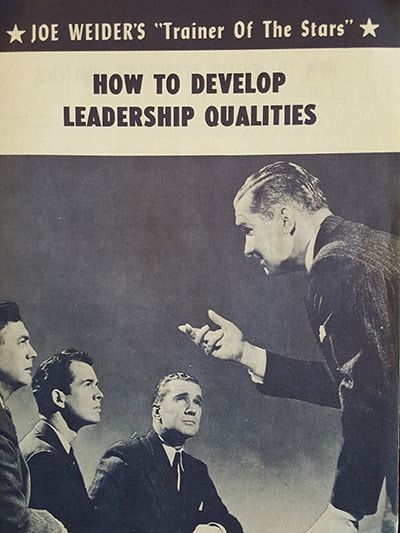Editor’s note: As one of the fathers of modern bodybuilding, Joe Weider founded the International Federation of BodyBuilding, created the Mr./Ms. Olympia contests, and published numerous fitness magazines. He also developed several weight training programs in the 1950s, many of which were available by mail-order. Weider was interested in helping his clients build the whole man, and along with the booklets on bodily development he sent out to subscribers, he sometimes included pamphlets on how to strengthen other aspects of their lives like dating and career. And they’re actually quite good! Below you’ll find Weider’s advice from one of these pamphlets on how to develop the qualities of an effective leader. We’ve left the original formatting intact to preserve its punch and efficacy.
____
My dear student:
A leader must be a strong man — not a weakling. People are attracted to strength as though by a sixth sense — as potent as the sense of taste, sight, hearing, touch, and smell. It is an intuitive sense of almost magical power.
Women in particular are strongly attracted to male strength. If you are strong they depend upon you — you magnetize them. Men, also, react instinctively to strength. When you are strong they look up to you, respect, and admire you.
It might well be said that the dominant quality of male strength is the feeling of reliability you inspire in men and women. For the weakling will not face up to his own responsibilities, and consequently will not impress others favorably enough for them to place any reliance in what he says or does. Such a weakling shifts his responsibilities to others — he is not able to buckle down to them himself. The strong man, however, relies completely upon his own powers; a self-reliance that will always see him — and often others — through any crisis.
TO BE A LEADER YOU MUST DEVELOP SELF-RELIANCE
“Trust yourself,” wrote Ralph Waldo Emerson, “Every heart vibrates to that iron string!” “Say yes to life…be a voice, not an echo!” No one can make the best of himself without a generous measure of self-reliance. Your God-given powers of maleness are fettered until you have the courage to try and develop that self-reliance.
How can you acquire self-reliance? What can you do to develop that strong self-respect that makes each day of life an adventure instead of an excursion into fear? The first step is to…
RECOGNIZE THAT YOU ARE ABSOLUTELY UNIQUE IN THIS WORLD
It is a staggering fact that of all the billions of people in this world there are no two of them alike. Therefore you are unique, and because you are unique you have a contribution, a strength and an opportunity to give the world something that no one else can give! Therefore, again, you must trust yourself because it is your life and not some other’s. You have a unique position in life…you have destiny to achieve! The next step in developing self-reliance, or self-leadership is to…
DISCOVER YOUR STRONG POINTS AND DEVELOP THEM
Certainly no one of us can do everything or know everything. But each of us can do one, two or many more things well…perhaps better than anyone in the world can do! Therefore you should place your talents or your gifts or skills high in the scheme of things…you should learn even more about them…you should develop them so throughly that you will be preeminent in them. For as you develop these strong points more completely you grow in stature in your own mind and in the minds of others. When you can trust yourself implicitly to do or know these things well, others will as quickly place their trust wholeheartedly in you.
Enrich your life by concentrating upon your strong points, for by so doing, you develop the self-reliant character that will cause others to admire, respect…even envy you.
LIVES OF GREAT MEN REMIND US…
A further step in developing self-leadership or self-reliance is to read the biographies of outstanding men of this and other ages. From each reading, this great truth will emerge: That the men whom history records as great WERE NOT SUPERMEN, but people very much like you who were conscious of their own imperfections…often baffled by circumstances…often thwarted by “unlucky” happenings. But they were people of purpose, and nothing — not even their own weaknesses — prevented them from following their dominating purpose, their chosen and deliberate way…to reach their end and goal.
Most of them had more than their share of misfortune and frustration. But they had guts…they kept on! If you will read such biographies it will be so much easier to believe in yourself…in your ability to do equally heroic things. For self-reliance — like so many of the best things in human personality — is caught, rather than taught!
KEEP A MENTAL PICTURE BEFORE YOU OF THE YOU YOU WANT TO BE!
Freud said, “Hold continually before your mind a picture of the kind of self you wish to be. Reaffirm it to yourself in quiet moments. Feed upon it! We grow like the things that we inwardly cherish, and those things the mind most deeply harbors, direct its energies and control its activities.”
The biblical adage says it even more strongly: “As a man thinketh in his heart, so is he.” When you have proved through following these simple steps that at last you can be master of yourself, prove that you can be a masterful leader of others. You can do this in such a simple thing as the job you’re in.
If you are of average intelligence, and apply the principles just mentioned to your own life, it will not be very long before your employer notices the stronger, more self-reliant employee he has. He will want to put your self-reliance and self-confidence to better use. He will want to make you a leader instead of “one of the herd.” Quite probably he will advance you to a supervisory position. It is here that your mettle will be thoroughly tested…and it is here that these guides will serve you well.
1. BE CONSISTENT
- Keep the promises you make…keep the rules you impose. Don’t permit something one day and object to it the next. Don’t become angry with one person for doing the same thing you permit another to do, unless you can give a good reason for the distinction.
- Don’t issue orders or give instructions or make plans and then cancel them without a very good reason.
- Don’t lose your temper or make a fuss over nothing. If you do you’ll keep others in perpetual fear of “putting their foot in their mouth.”
- If you expect others to be efficient, be efficient yourself…remember things, know where equipment is, how to use time wisely and how to do your own work. One example is worth a thousand sermons.
Remember this: Unpredictability is a maddening quality in a leader, and far more frightening even than sternness.
2. EXPLAIN ANYTHING PUZZLING
If you have to issue an order that you know will be unpopular, or that seems absurd, a few moments explanation, or a few words on a notice will save your face. Quite often even the angriest person can be quieted and made co-operative by a few words of quiet explanation. For instance: To put up a “NO SMOKING” sign is neither as polite (or effective!) as “NO SMOKING, PLEASE: INFLAMMABLE MATERIALS.” The latter changes what seems like a prohibition into a necessary precaution.
3. PRAISE GOOD WORK
Don’t flatter anyone, this is not a leadership quality…it is one of weakness. Flattery cheapens praise until it means nothing and gives no pleasure.
However, when someone does really good work, single him out and point out the specific things you found that made the work praiseworthy. Not only will this encourage the good worker, but it shows slackers that good work pays off…which may encourage them to better efforts!
When you are complimenting a group, look at each and every one of that group at sometime during your praise. An omission often causes a resentment all out of proportion to its importance.
A good leader not only praises people for good work, but looks for other ways of encouraging them and demonstrating his interest in them. “How is your new baby?” (Remember the baby’s name, if you can). Or, “How is your cold…I hope it is better.” Such remarks cost nothing, but give others the impression that they are far more than names on the payroll book.
4. CRITICIZE REASONABLY AND POLITELY
Since none of us is infallible, all of us make mistakes. The inexperienced leader will rejoice in making others feel small. But the thrill of “feeling big” is a costly luxury that makes another rebellious, and discourages him from even attempting good work.
When we must criticize someone, we should do it if possible in private…but if not, then in a very low voice so that the erring person is not made to feel a fool in front of others.
Avoid sarcasm…it never succeeds, and invariably makes enemies.
Avoid shouting…this a sign of weakness, a sure sign of lack of self-control.
No one should be made to suffer for a mere human blunder or a moment of human weakness. But we can point out the serious possibilities of his mistake. However if the mistake occurs through laziness or neglect, then the mistake deserves a real rebuke…and sometimes even a penalty.
Never tell others that they are hopelessly stupid, it’s the surest way of making them so! If you will confine your criticism to the immediate mistake, YOU IMPLY THAT THE PERSON CAN DO BETTER NEXT TIME.
Try if possible to watch for special causes of unsatisfactory work or unsatisfactory behavior. Such things as the fellow who’s on the wrong job…the two fellows who dislike each other but who are forced to work together…the man who is chronically ill and who continually badgers others about his illness and how the “job is making it worse.” Quite often a bit of supervisory wisdom, sympathy and willingness to adjust will save the day for all concerned, and make for a happier, more efficient staff.
Even when you are called upon to administer the sternest discipline, even to the point of discharging an employee…do it kindly, with justice. If you can make such an employee know the precise reasons for his dismissal…and make him see that you simply would not think of letting him go if you could possibly avoid it, you will make him speak well of you and your fairness. Your consideration may be the force that will cause him to do better in his next job; and you can be sure that his praise of you will reach other ears…a fact that can do you nothing but good.
5. ENCOURAGE COMMUNITY EFFORT
As a leader or supervisor you must often give orders, and must see that they are obeyed. That’s what a leader is for. But when you have a happy, harmonious group, this is by far the easiest to command.
If, as a leader, you know of bad feelings between individuals in that group, you should make the most tactful efforts to smoothe things out…even if your only remedy is to keep the “fighting factions” apart.
If someone is a misfit in your group, you should at least make an attempt to help him and encourage him. Don’t write him off as a bad deal until you have made every effort to improve his status.
If tempers become frayed it is your task to calm them by kind, but firm words, by suggestion of sensible compromise, or by finding a face-saving expression that all can accept. There are times when the solution can be simply achieved by saying, ’’Well, we are all rather on edge (or tired) and we don’t seem to be getting anywhere. Let’s call it a day for now.”
Never encourage the “tattle-tale.” Quite often a sneak may at first be useful…but soon he poisons the entire group atmosphere. Anyone who has held authority knows that there are some people who try to make themselves important by criticizing others. Such people invariably make their colleagues miserable and inefficient.
If someone brings you a tale, say, “Please don’t tell me any names, I’ll look out for what you have told me, but I would rather find it out for myself than be told tales.”
If people are disloyal to their associates, they will certainly not be loyal to their superiors. Some people will do anything to feel important. If you are a wise leader, you will make them feel important for other things than tale-bearing.
6. BE ACCESSIBLE
Don’t be over-familiar with your employees. Too much use of first names…the “buddy-buddy” spirit…too much inquiry or interest in private lives can be resented.
But a good leader must be accessible to anyone who has a genuine “beef,” a serious personal problem, or a suggestion. Don’t make it so difficult to approach you that it must be “done through channels.” You’ll lose contact with the world around you if you do.
However, you are busy, and therefore you cannot be accessible all the time. That doesn’t matter. What is important is that everyone should know that you can be seen, can be approached privately — if necessary — at some fixed or reasonable time.
7. BE FIRM — BUT DON’T BULLY
The most commanding people I’ve met were the gentlest and kindest. Only the weak individual becomes a bully. He is the one who yields to a stronger bully.
One of the great advantages of the habit of explaining anything that sounds strange or odd is that in a real crisis — when there’s no time for explanation — you will be obeyed without question because you are trusted. Such a personal consideration, self-reliance and self-discipline may easily save the life of dozens of persons in some crisis!
An advantage of “speaking softly but carrying a big stick” is that when once or twice a year you become justifiably angry, it really means something and THE OFFENDER KNOWS IT!
Never carp! Let people know that if you never criticize their work then you are pleased with it. Then when you do have a valid reason for criticism…the employee will bend every effort to correct the mistake or do even better work in the future. He’ll even lean backward to make you pleased with his efforts. Certainly it will crystallize in his mind this thought: “Well, if he has gone on so long without criticism because he thinks I’ve done good work, then this criticism must be justified, and my work must really be bad, else he wouldn’t comment on it!”
It is only by being kind, pleasant and just most of the time that you can justly and usefully be severe when a real need arises!
Never be weak, vacillating, or apologetic when giving or enforcing an order. You must make your employees see that it is to be done at once and without question. You gain respect by being courteously firm, and sure of yourself. For people can quickly read weakness and lack of confidence if you bluster.
Never say, “I’m going to get what I want, and I mean what I say!” You won’t and you don’t, and no one will believe you! Authority is not — in itself — something to be respected. Many people begin by resenting authority. It is the way you administer authority that makes self-confidence, self-reliance and self-control a virtue…and it is the thing that makes its recognition by others a fine art. Leadership is a fine art…it’s the art that has won wars, secured peaceful pacts and treaties, solved violent disputes. Man makes the leader…but leadership makes the man. You can only develop the fine art of leadership by first being strong yourself. When you have accomplished this…then the world is yours for the taking!







